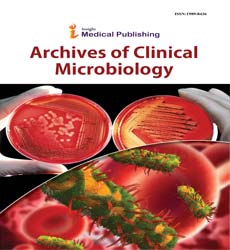Abstract
Association Between Aflatoxin B1 Albumin Adduct Levels and Tuberculosis Infection Among HIV+ Ghanaians
Background: Aflatoxin exposure has been shown to cause cell-mediated immune suppression and enhance HIV viral replication. Such immune suppression from aflatoxin can impair resistance to both infectious diseases and chronic infections.Methods: Hazard ratios (HRs) with 95% confidence intervals (CI) and a test for trend for opportunistic infections OI) among 141 HIV positive Ghanaians based on quartiles of aflatoxin B1 albumin adduct levels (AF-ALB) were calculated.Findings: HRs were significantly higher for developing symptomatic TB (HR 3.30, 95% CI 1.34-8.11) for those in the highest AF-ALB quartile compared to the lowest. Significantly higher HRs were not observed for other infections investigated.Conclusions: Those with the highest levels AF-ALB from dietary intake have an increased hazard of symptomatic TB but not malaria, HBV, or pneumonia.
Author(s): John Keenan, Pauline Jolly, Peter Preko, Joseph Baidoo, Jia-Sheng Wang, Timothy D Phillips, Jonathan H Williams, Gerald McGwin
Abstract | Full-Text | PDF
Share this

Abstracted/Indexed in
- Google Scholar
- Open J Gate
- Genamics JournalSeek
- The Global Impact Factor (GIF)
- Open Archive Initiative
- China National Knowledge Infrastructure (CNKI)
- Scimago
- Directory of Research Journal Indexing (DRJI)
- WorldCat
- Proquest Summons
- Publons
- MIAR
- ResearchGate
- University Grants Commission
- Geneva Foundation for Medical Education and Research
- Secret Search Engine Labs
Open Access Journals
- Aquaculture & Veterinary Science
- Chemistry & Chemical Sciences
- Clinical Sciences
- Engineering
- General Science
- Genetics & Molecular Biology
- Health Care & Nursing
- Immunology & Microbiology
- Materials Science
- Mathematics & Physics
- Medical Sciences
- Neurology & Psychiatry
- Oncology & Cancer Science
- Pharmaceutical Sciences

